Heading 1
Heading 2
Heading 3
Heading 4
Heading 5
Heading 6
Lorem ipsum dolor sit amet, consectetur adipiscing elit, sed do eiusmod tempor incididunt ut labore et dolore magna aliqua. Ut enim ad minim veniam, quis nostrud exercitation ullamco laboris nisi ut aliquip ex ea commodo consequat. Duis aute irure dolor in reprehenderit in voluptate velit esse cillum dolore eu fugiat nulla pariatur.
Block quote
Ordered list
- Item 1
- Item 2
- Item 3
Unordered list
- Item A
- Item B
- Item C
Bold text
Emphasis
Superscript
Subscript

Your GTM team spends more time fixing broken demo environments than actually demoing. Demostack promised to solve this with their powerful sandbox environments.
It works fine for large enterprises with dedicated technical teams. But at $55,000+ annually with weeks of setup and constant maintenance after every product update, it's overkill for most organizations.
As a PMM at Storylane—someone who's used demo platforms across different team sizes—I've seen teams achieve better results with leaner, more practical solutions.
Here are 8 Demostack alternatives that actually fit how modern presales teams work.
Best Demostack alternatives: top picks
Why teams switch from Demostack
The reason most teams switch from Demostack is because of its:
- Complex setup: Requires significant engineering resources to implement
- High maintenance: Every product update breaks your demo environments
- Steep learning curve: Takes weeks for new team members to become productive
- Enterprise-only pricing: Starting at $55,000+ makes it inaccessible for many teams
- Limited flexibility: Focused solely on sandbox environments, not other demo types
What teams actually need:
- Quick demo creation for different audiences
- Multiple demo formats (HTML, video, screenshot)
- Easy maintenance and updates
- Pricing that scales with team size
- Minimal technical overhead
Best Demostack alternatives: detailed analysis
1. Storylane - Best overall alternative
Storylane solves the core problem with Demostack: you shouldn't need a technical team to create demos that actually convert prospects. You get three demo types that match how buyers want to consume product information—HTML demos for hands-on exploration, screenshot demos for overviews, and sandbox environments.
Key features
- Multi-format demo creation: Screenshot demos for quick overviews, HTML demos for hands-on exploration, and sandbox environments when you actually need them.
- Lily AI sales agent: Conversational sales agent trained on your best sales resource for automated product discovery, lead qualification, and objection handling
- AI demo creation: Automatically generates demo scripts, voiceovers in 65+ languages, and AI avatar presenters
- No-code interface: Click through your product once, get a demo in minutes—no engineering required
- Smart personalization: Drop in prospect names, company logos, and relevant data without rebuilding demos
- Buyer Hub: Package multiple demos, PDFs, and case studies into a neat, branded experience that lets prospects self-discover your product at their own pace.
- Account reveal: See exactly which companies are engaging with your demos, even anonymous visitors
Pros
- 15-minute setup vs Demostack's weeks-long implementation
- No engineering required - presales teams build independently
- Predictable pricing starting free vs $55k+ enterprise commitment
- Zero maintenance overhead: Demos don't break when your product updates
Cons
- Doesn’t support complex live product overlays with real-time data injection (unlike Saleo or similar tools)
Pricing
- Free: 1 free screenshot demo with unlimited views.
- Starter: $40/month per seat— unlimited screenshot + video demos and AI features
- Growth: $500/month for 5 seats—HTML demos and advanced personalization
- Premium: $1,200/month for 10 seats—Demo Hubs and sandbox environments
- Enterprise: Custom pricing with unlimited seats
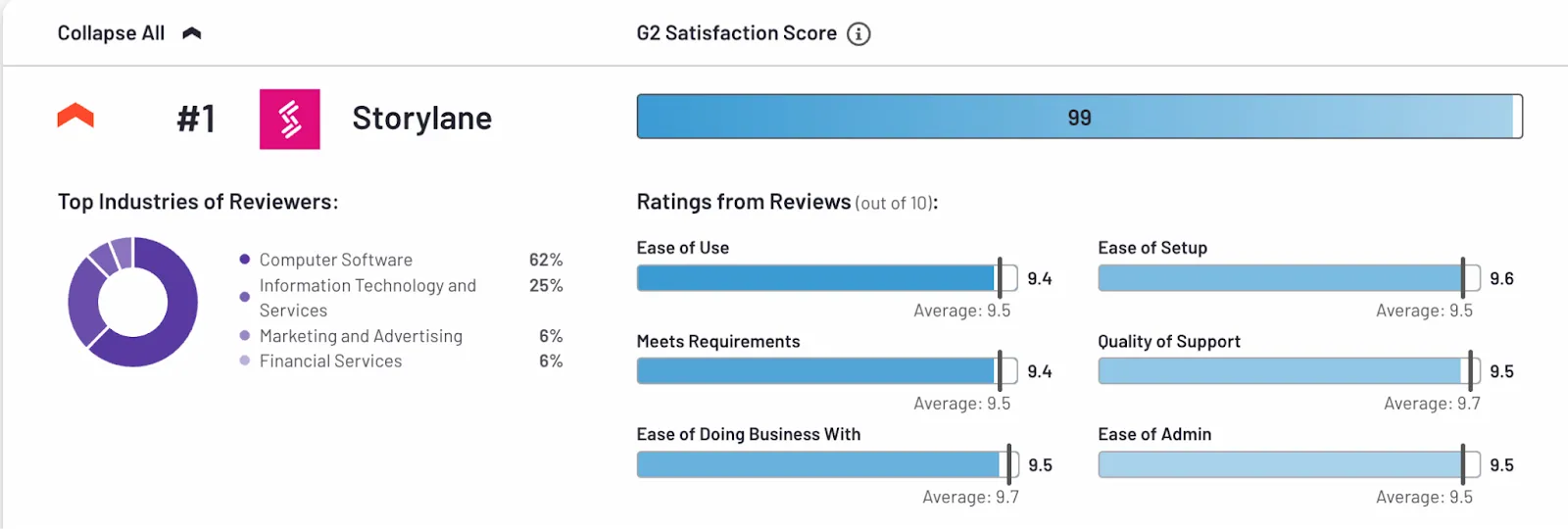
Best for teams who need to create multiple types of demos quickly and want to prove ROI before committing to enterprise-level investments.
2. Saleo - Best for live product overlays
Saleo creates a "skin" over your actual product, allowing you to demo the real application with customized data. Everything works exactly like your live product, but with clean, relevant demo data instead of messy production information.
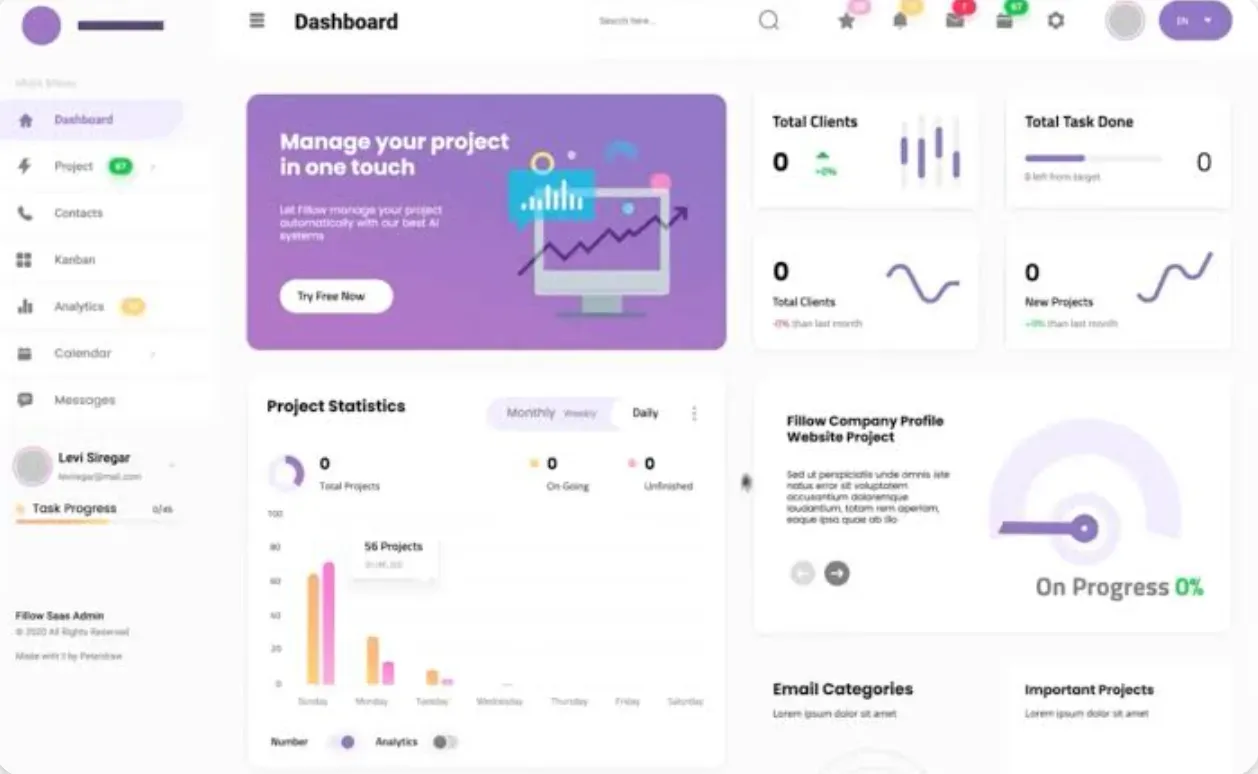
Key features
- Real-time product overlays: Modify data, text, and visuals in your actual product without affecting functionality
- AI personalization: Dynamically tailor metrics during live demos
- Collaboration tools: Real-time co-editing team demo creation (with role-based access)
- Sales integrations: Connects with Salesloft, Salesforce, and HubSpot
Pros
- Live product authenticity: Prospects experience your actual application, not a replica
- Maintains product functionality: All features, integrations, and workflows work exactly as in production
- Sales team friendly: Built specifically for AEs and SEs, not just technical teams
Cons
- Requires maintenance every time your product changes
- Data mapping isn’t possible without the support team
Pricing: Starts at $40,000/year
Best for complex enterprise software where prospects need to experience actual product functionality and authentic user workflows.
3. Reprise - Enterprise alternative with added flexibility
Reprise Replicate is the closest one-to-one alternative to Demostack. It creates replicas of your application while offering more flexibility in customization and API integration than Demostack's more rigid approach.

Key features
- Application replication: Creates near-exact replicas of your software at the code level
- API integration: Developers can build custom functionalities into demos
- Offline capabilities: Demos work without internet for trade shows and events
- Enterprise security: SOC 2 Type II, GDPR, and CCPA compliance
- Bulk customization: Change images, data, and text across multiple demos simultaneously
Pros
- More flexible API: Easier to customize and extend demo functionality
- Better offline support: Reliable demos for events and presentations
- Advanced customization: More options for personalizing demo environments
Cons
- Requires technical expertise for implementation
- Higher price point than Demostack for similar functionality
- Long implementation timeline (8-12 weeks typical)
Pricing: Starts at $40,000/year
Best for enterprise teams that need Demostack-like functionality but want more API flexibility and customization options.
4. Testbox - Best for no-code sandbox creation
Testbox operates on live instances of your product while automatically generating realistic demo data. It's like Demostack but with less technical overhead and automated data management.
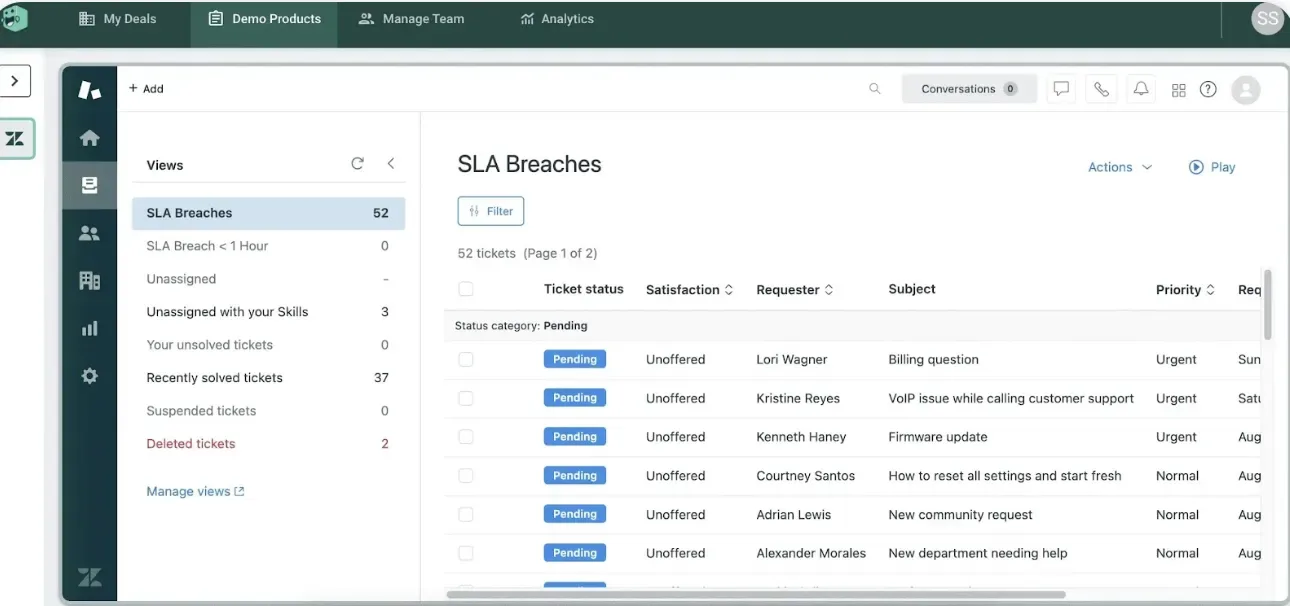
Key features
- Live product instances: Operates on actual product versions, automatically updating with changes
- AI-generated data: Creates realistic, industry-specific datasets without manual work
- Preconfigured environments: Ready-to-use sandboxes with functional integrations
- Custom datasets: AEs can select relevant data for different verticals and personas
Pros
- Automatic updates: Demos stay current with product changes without manual intervention
- Faster implementation: Quicker setup than Demostack's complex cloning process
- Actionable insights: Better analytics on stakeholder engagement and feature interest
- Accessible pricing: Comparably accessible pricing and setup requirements
Cons
- Still requires developer support for implementation
- Security considerations due to live product integration
- Limited customization compared to full sandbox environments
Pricing: Starts at $33,000/year for 15 users
Best for teams that want sandbox-like functionality but need faster implementation and automatic maintenance.
5. Walnut - Best for sales-focused HTML demos
Walnut creates interactive HTML demos with a focus on sales use cases. Even though it is not as comprehensive as Demostack's sandbox approach, it offers a middle ground between simple screenshots and full environments.
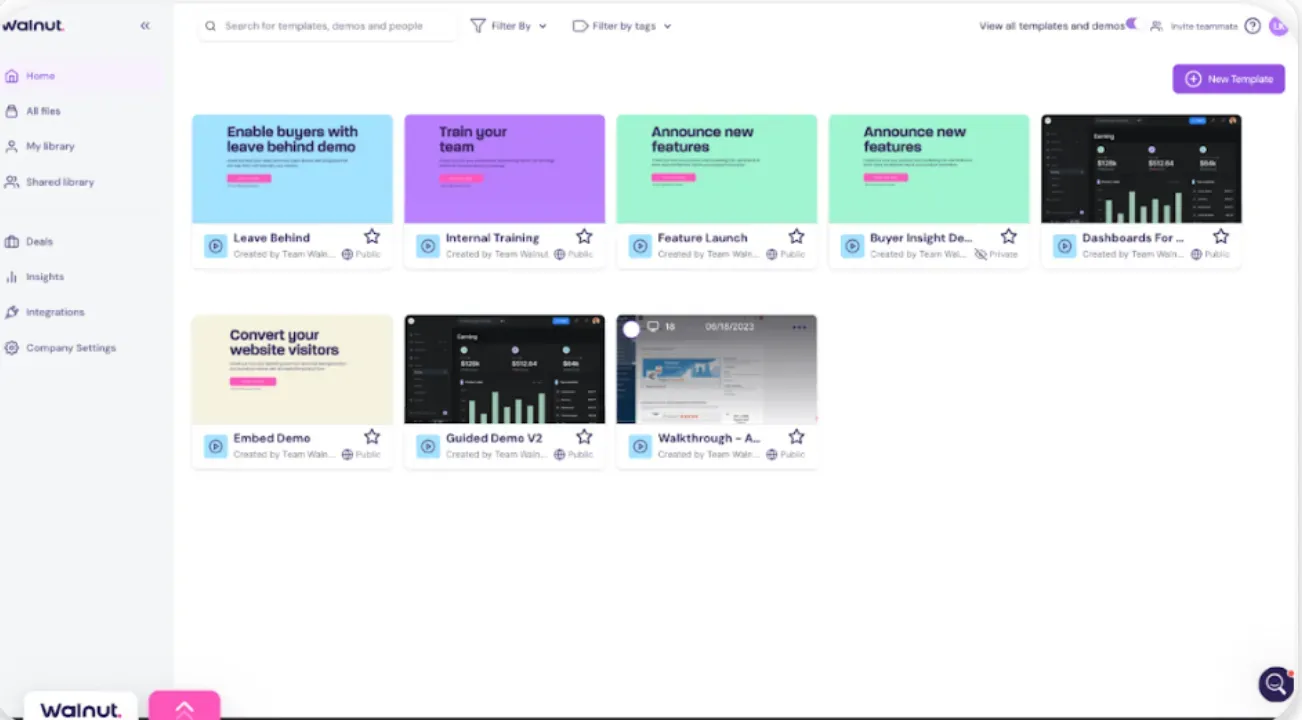
Key features
- AI-powered demo creation: NuttyAI accelerates demo production and script development
- Interactive elements: Hotspots, guided tours, and in-demo feedback collection
- Sales integrations: Built specifically for sales team workflows and CRM connectivity
- Enterprise security: GDPR compliance, SOC 2 certification, MFA, and SSO
Pros
- Lower entry barrier: Subscription-based pricing vs annual enterprise commitments
- AI assistance: Automated demo creation reduces manual work
- Sales-specific features: Built for AE and SE workflows rather than technical teams
Cons
- Steep learning curve despite marketing claims
- Missing basic features like auto-save
- Limited to HTML demos only
Pricing: Starts at $10,000/year
Best for sales-led organizations that need interactive demos but don't require full sandbox environments.
6. Demoboost - Best for presales workflows
Demoboost focuses on presales team needs with features like speaker notes, live demo analytics, and structured demo flows that SEs create for AEs to use.

Key features
- Live demo enhancement: Speaker notes and real-time analytics during presentations
- Demo templates: Flexible and reusable frameworks for different presales scenarios
- Partner enablement: Tools for training channel partners on demo delivery
- Marketing integration: Demo galleries for campaigns with A/B testing capabilities
- Comprehensive analytics: Track engagement, completion rates, and NPS scores
Pros
- Presales-specific: Built for SE workflows rather than general demo creation
- Live demo support: Better real-time assistance during presentations
- Flexible templates: Easier to create variations for different use cases
Cons
- Requires coding skills for advanced customizations
- Performance issues and lags reported by users
- Plugin stability problems that affect productivity
Pricing: Starts at $10,000/year
Best for mid-market presales teams that need structured demo workflows and real-time presentation support.
7. Cloudshare - Best for complex virtual environments
Cloudshare specializes in virtual environment demos for complex enterprise software that requires multiple applications, specific infrastructure, or legacy system configurations.
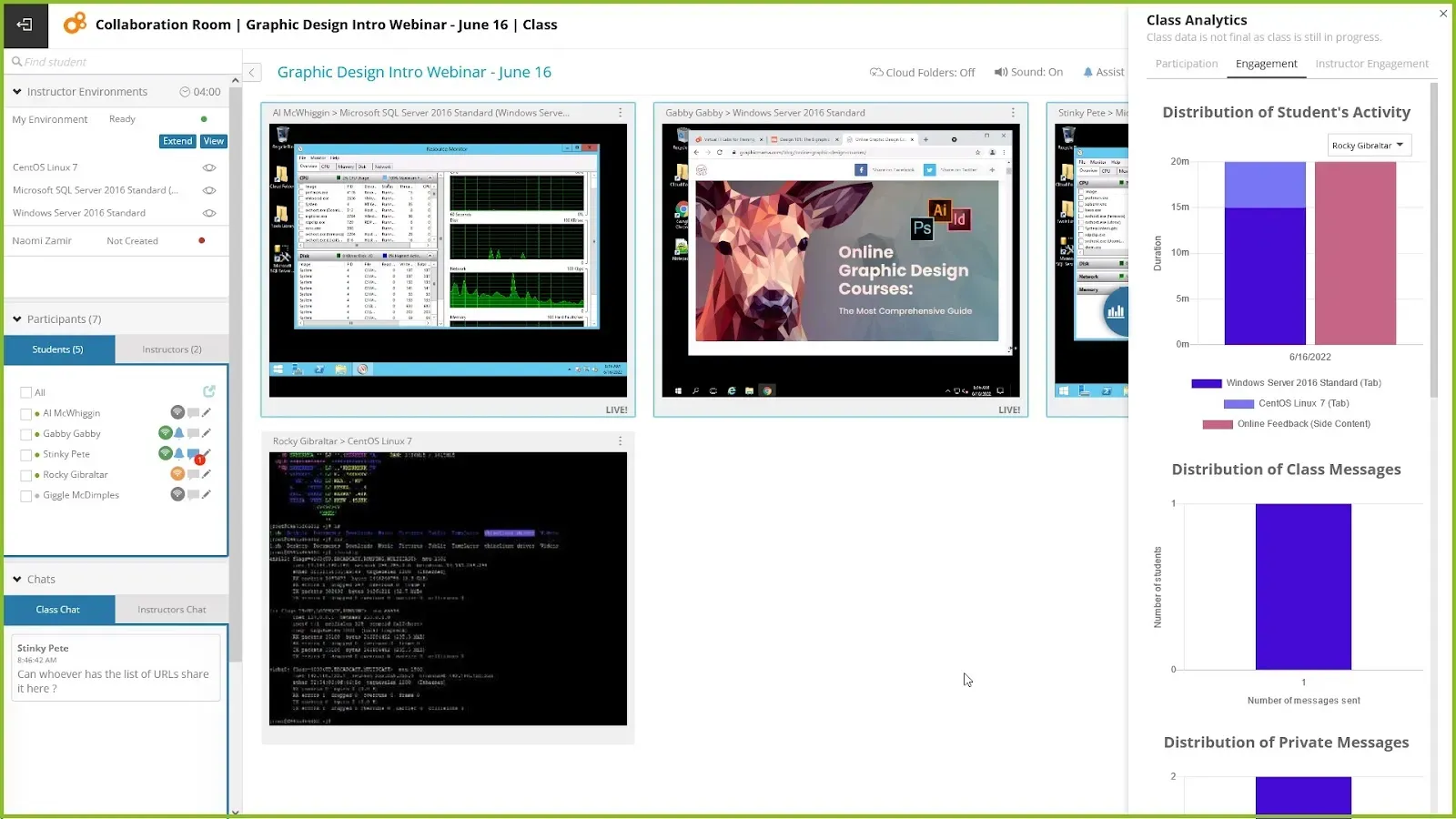
Key features
- Virtual environment replication: Deploy complete software stacks with multiple applications and databases in controlled virtual spaces
- Multi-application demos: Demonstrate how different software components work together as integrated systems
- Collaborative access: Multiple stakeholders can access and interact within the same virtual environment simultaneously
- Training integration: Seamlessly transition from sales demos to customer training using identical environments
Pros
- Works with old software: Supports legacy enterprise systems that other platforms can't handle
- Infrastructure management: Eliminates the need to manage servers, networking, and dependencies separately.
- Multiple apps at once: Demo entire software systems, not just one app
- No setup hassles: Don't worry about servers or technical configuration
Cons
- Steeper learning curve due to virtual environment complexity
- Limited interactive elements within demo environments
- Performance issues during peak usage
Pricing: Custom pricing based on specific requirements
Best for large enterprises with complex software requiring full virtual environment demos.
8. Olto - Best for data-secure live demos
Olto focuses specifically on data security and real-time personalization during live demos. It's designed as an intelligent overlay that handles PII replacement and data customization automatically.
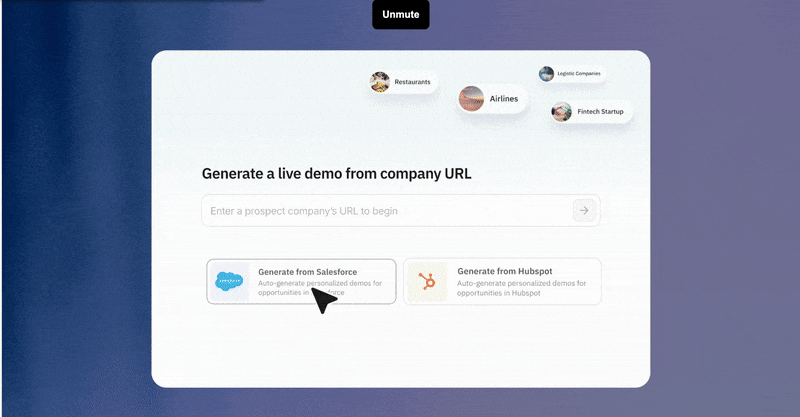
Key features
- AI PII replacement: Automatically anonymizes sensitive data in real-time
- Dynamic data manipulation: Change displayed information during live presentations
- Browser extension: Quick implementation without complex setup
- Magic mode: AI-crafted personalized demos based on use cases and personas
Pros
- Superior data security: Advanced PII handling beyond manual datasets
- Real-time flexibility: Dynamic data changes during live demos
- Easy implementation: Browser-based setup vs complex environment cloning
Cons
- Not a complete sandbox environment replacement
- Limited feature set due to early-stage development
- Focused on overlay functionality only
Pricing: Starts at $40,000/year
Best for teams prioritizing data security and real-time demo personalization over comprehensive sandbox functionality.
Which Demostack alternative should you choose?
The right alternative depends on your specific needs, team size, and technical requirements:
For most teams: start with Storylane
Why: Fastest implementation, multiple demo types, proven ROI, and pricing that scales with your team.
When to choose: You need demos for different audiences (technical buyers, executives, end users) and want to prove value before committing to enterprise pricing.
For enterprise sandbox needs: consider Testbox or Reprise
Reprise when: You need maximum customization and API flexibility for complex enterprise sales.
Testbox when: You want sandbox functionality but need faster implementation and automated maintenance.
For live overlay product demos: choose Saleo
When to choose: Your prospects need to experience actual product functionality, and you can manage the ongoing maintenance requirements.
The bottom line
While Demostack pioneered sandbox demo environments, the demo automation landscape has evolved significantly. Most teams get better results with platforms that offer multiple demo types, faster implementation, and more predictable pricing.
Start with Storylane if you want the fastest path to demo ROI. Its combination of ease-of-use, multiple demo formats, and proven customer success makes it the clear choice for most presales teams.
Consider enterprise alternatives like Reprise or Saleo only if you have specific requirements for sandbox environments or live product overlays that justify the higher complexity and cost.
The goal isn't to replicate Demostack exactly—it's to help your prospects understand and validate your product value as efficiently as possible.
FAQ: Demostack alternatives
What is the easiest Demostack alternative to implement?
Storylane is the fastest to implement, with most teams creating their first demo in under 15 minutes. Unlike Demostack's weeks-long setup process, Storylane's browser extension captures your product instantly with no engineering required.
Which alternative offers the most similar functionality to Demostack?
Reprise Replicate is the closest one-to-one alternative, offering comparable sandbox environments with pixel-perfect product replication. However, most teams find they don't actually need full sandbox functionality.
Are there budget-friendly alternatives to Demostack's enterprise pricing?
Yes, Storylane starts with a free plan and scales to $6,000/year for full HTML demo capabilities. Walnut and Demoboost start around $10,000/year, though both have lower user satisfaction scores.
Can these alternatives handle product overlay demos?
Saleo excels at complex overlay demos using custom data on your actual product.
Do any alternatives offer better analytics than Demostack?
Storylane provides more detailed engagement analytics including screen-level interaction data and anonymous visitor identification. Testbox offers better stakeholder engagement insights for sandbox environments.
Which alternative requires the least ongoing maintenance?
Storylane requires virtually no maintenance—demos don't break when your product updates. Testbox automatically updates with product changes. Saleo and Reprise require regular maintenance as your product evolves.
Ready to move beyond Demostack's complexity? Start with Storylane's free plan and create your first demo in minutes.
Heading 1
Heading 2
Heading 3
Heading 4
Heading 5
Heading 6
Lorem ipsum dolor sit amet, consectetur adipiscing elit, sed do eiusmod tempor incididunt ut labore et dolore magna aliqua. Ut enim ad minim veniam, quis nostrud exercitation ullamco laboris nisi ut aliquip ex ea commodo consequat. Duis aute irure dolor in reprehenderit in voluptate velit esse cillum dolore eu fugiat nulla pariatur.
Block quote
Ordered list
- Item 1
- Item 2
- Item 3
Unordered list
- Item A
- Item B
- Item C
Bold text
Emphasis
Superscript
Subscript









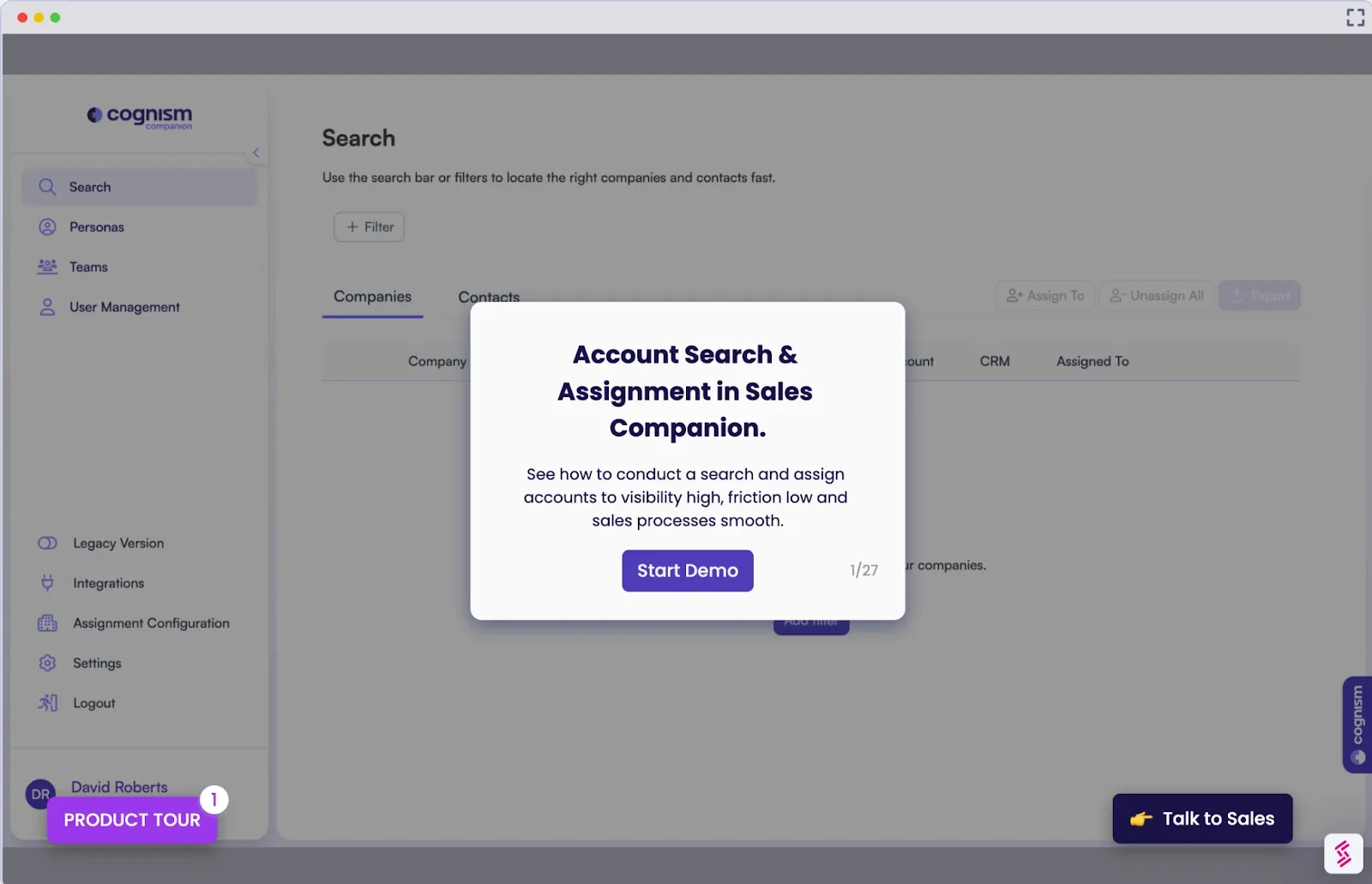
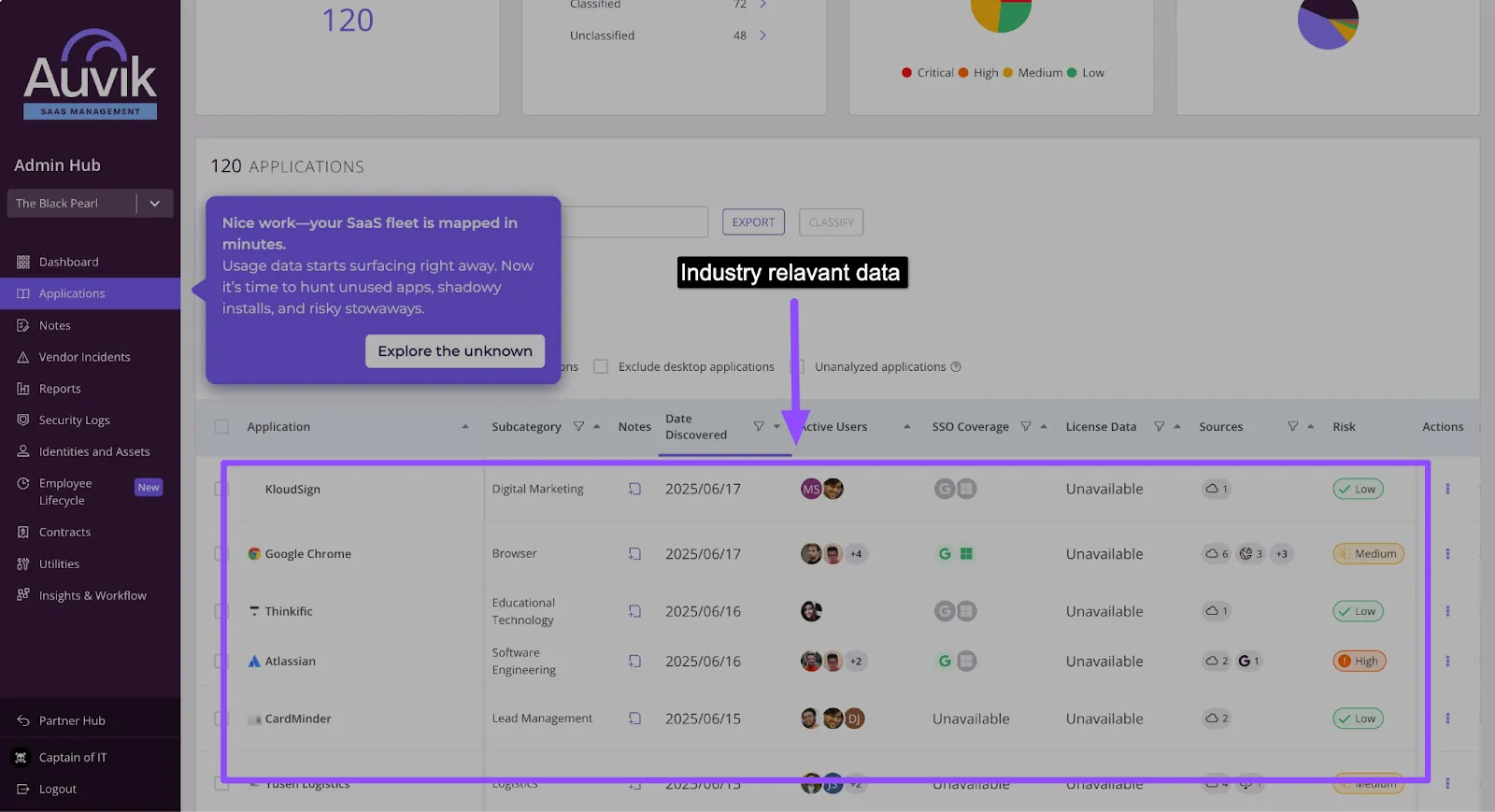
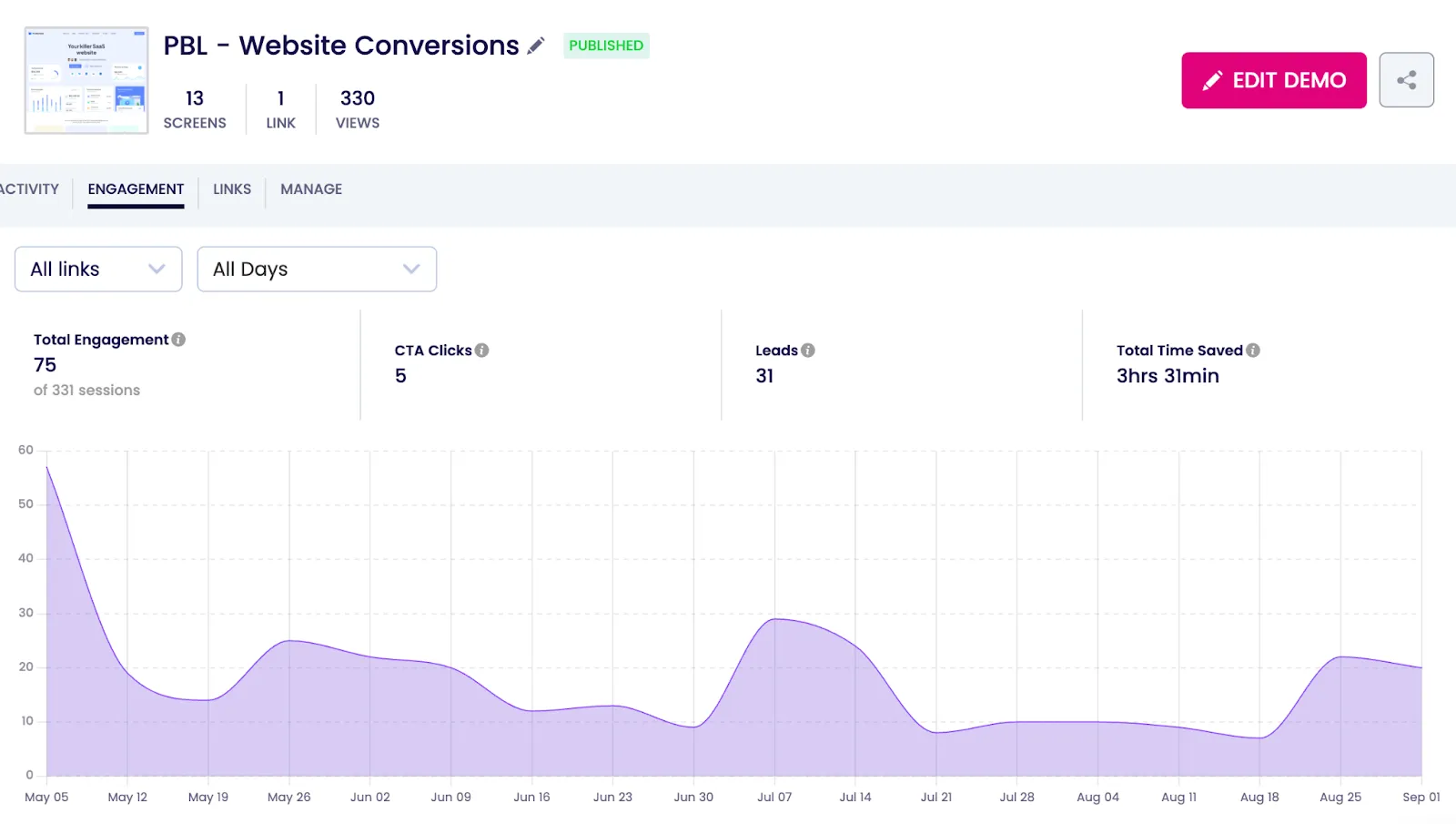
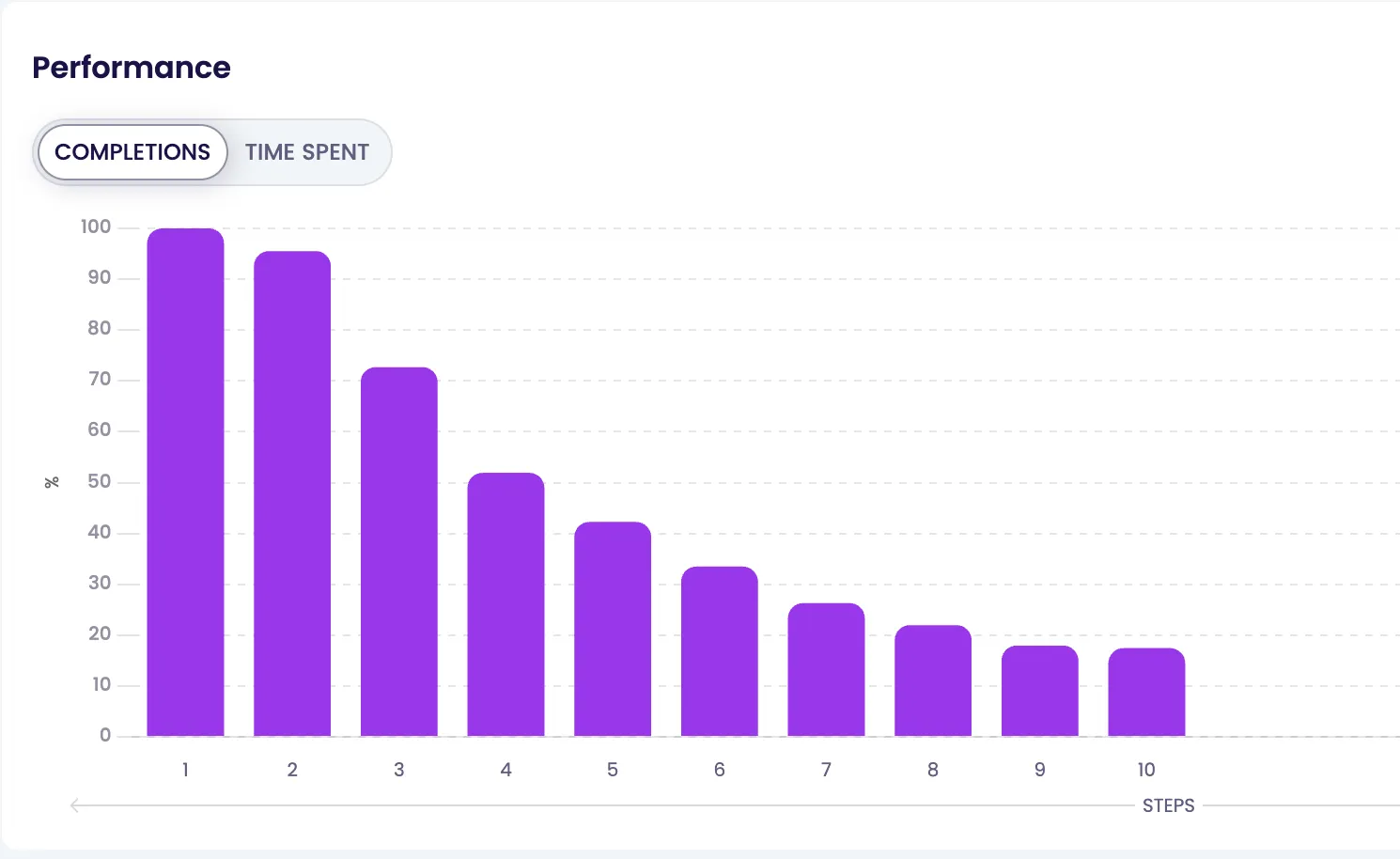
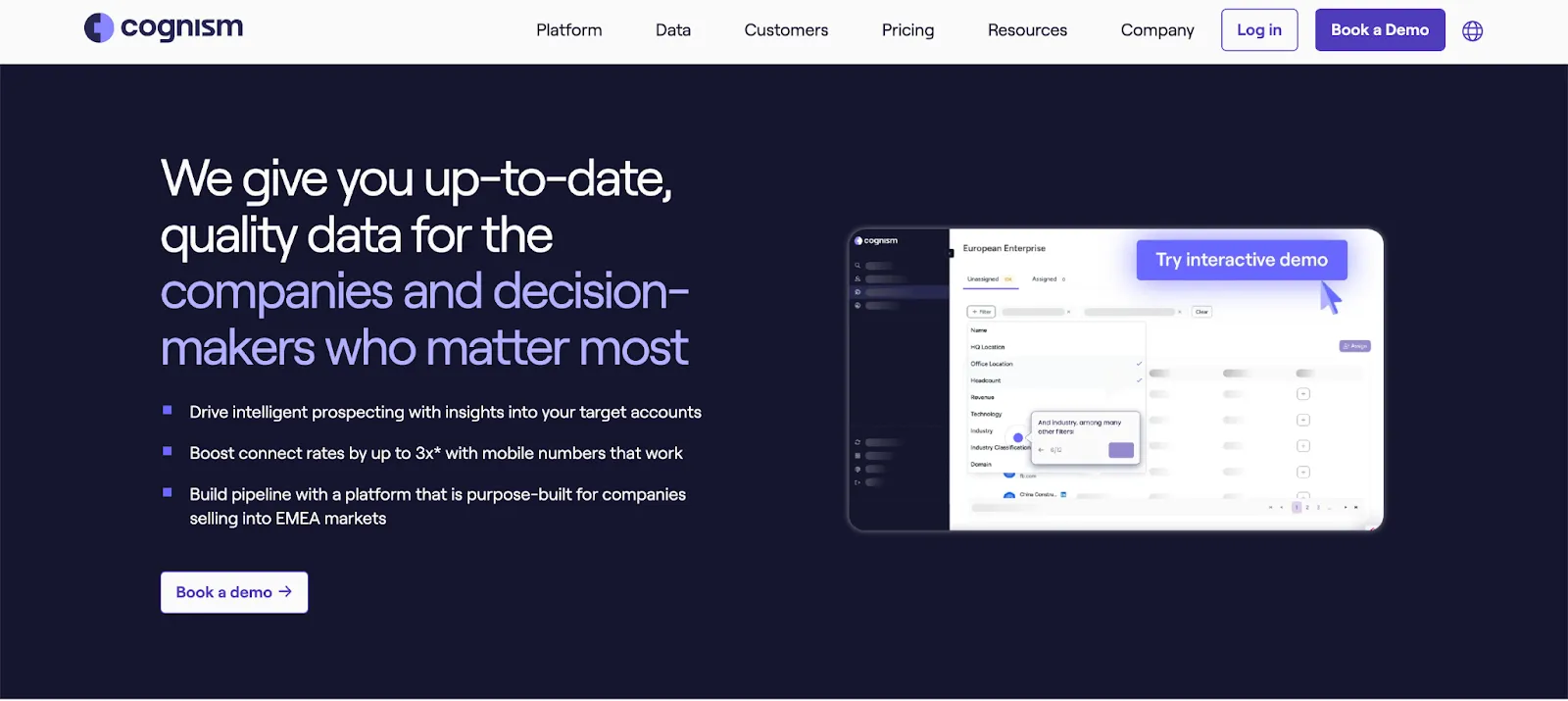



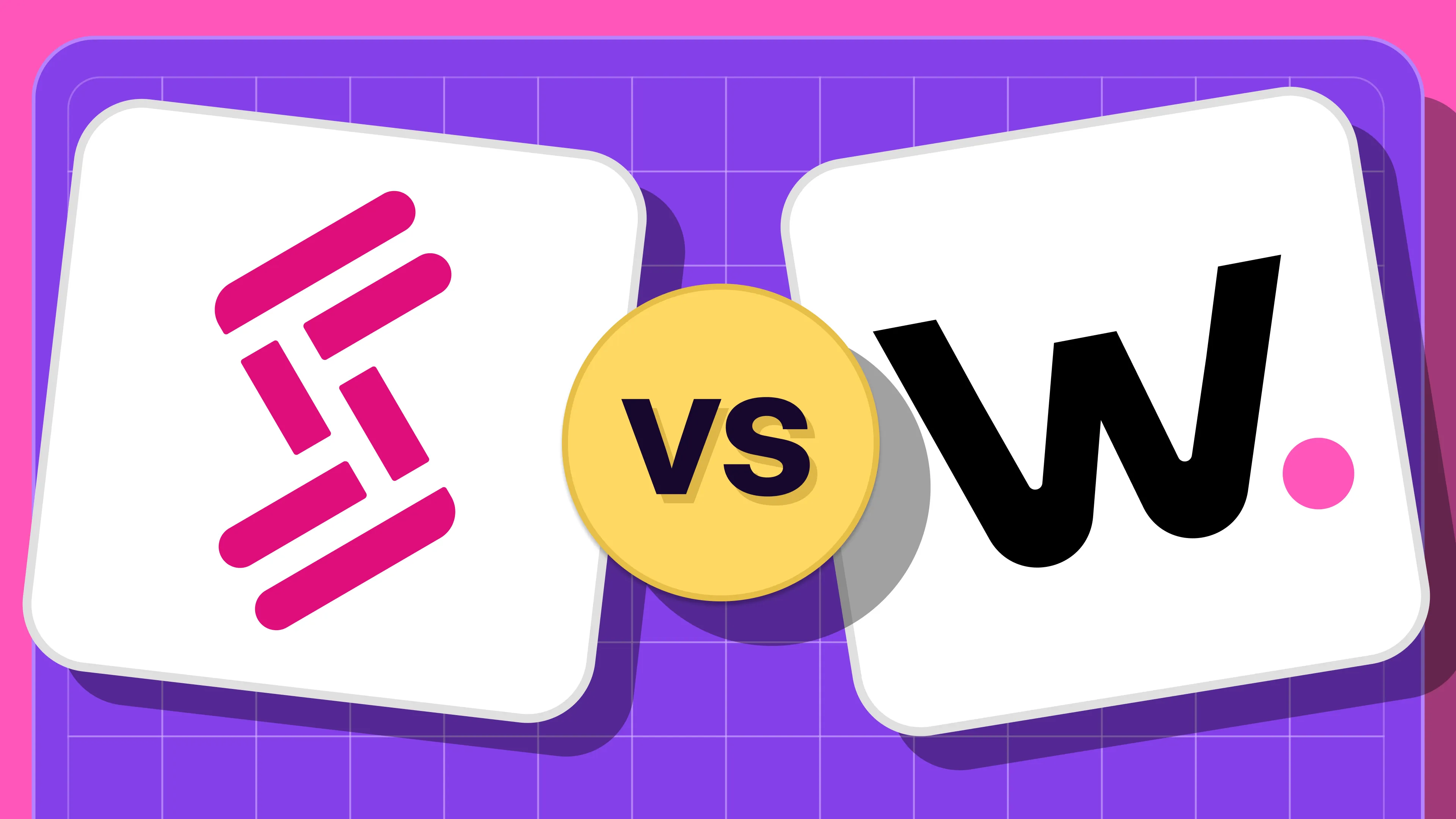
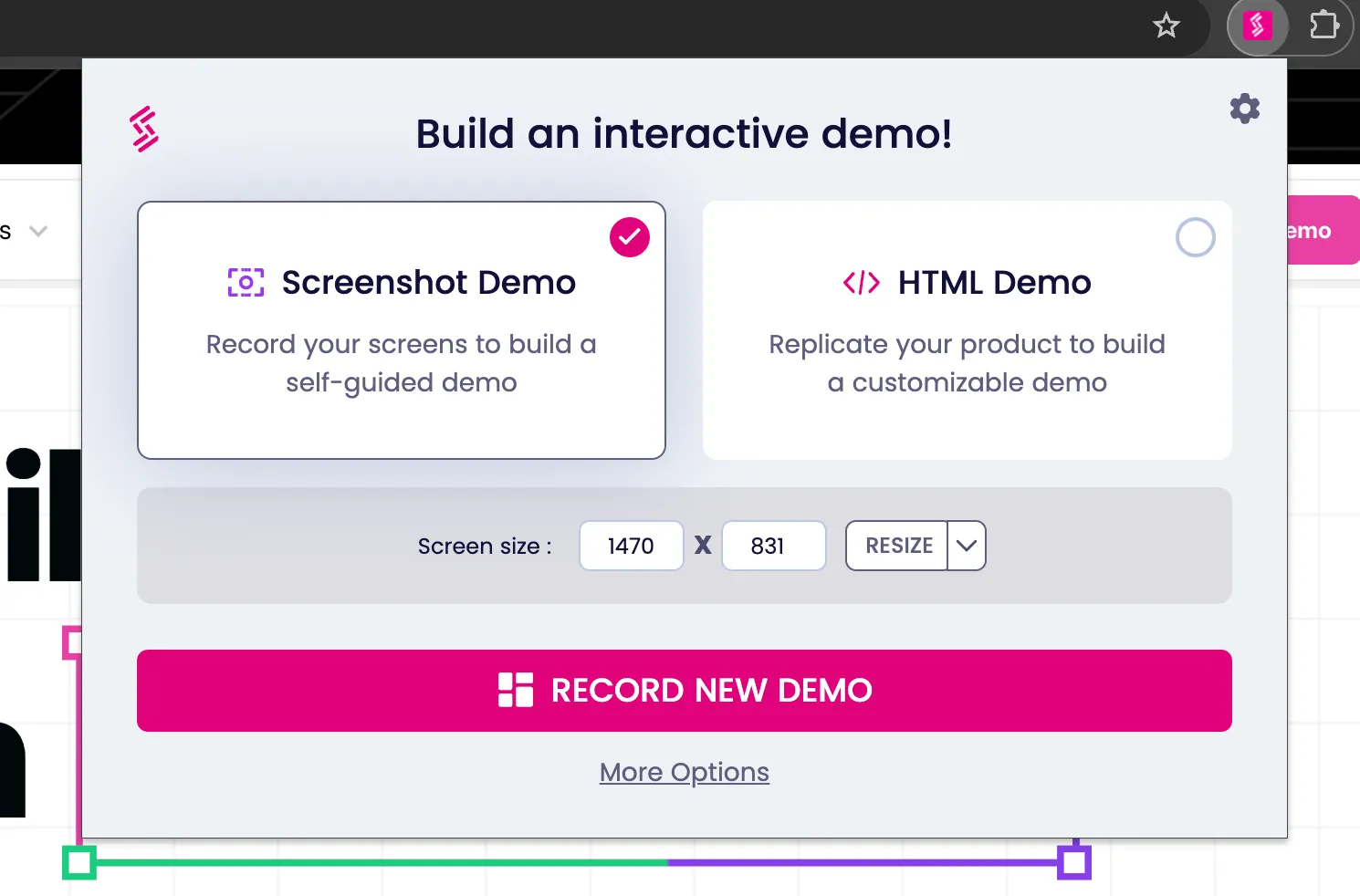

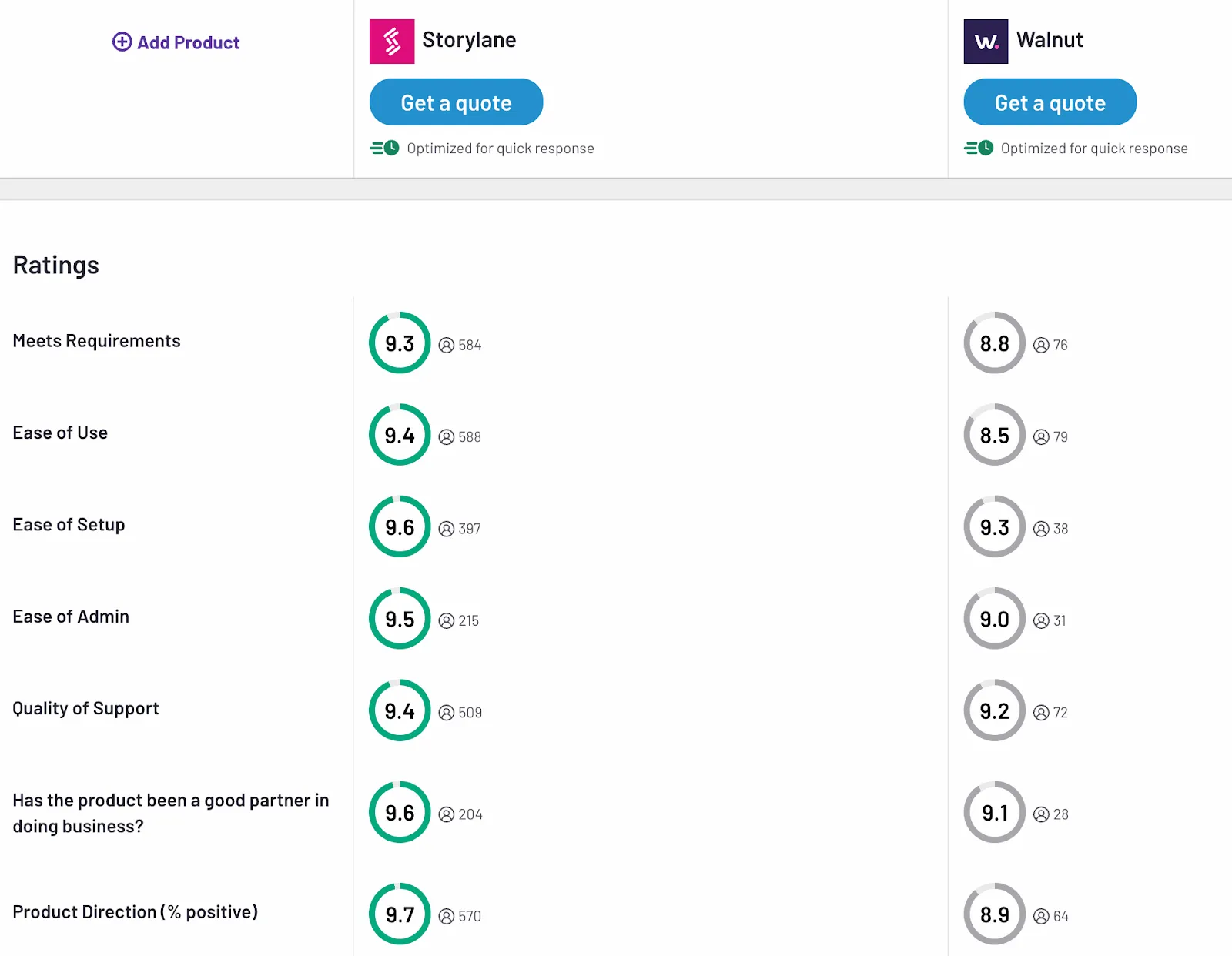
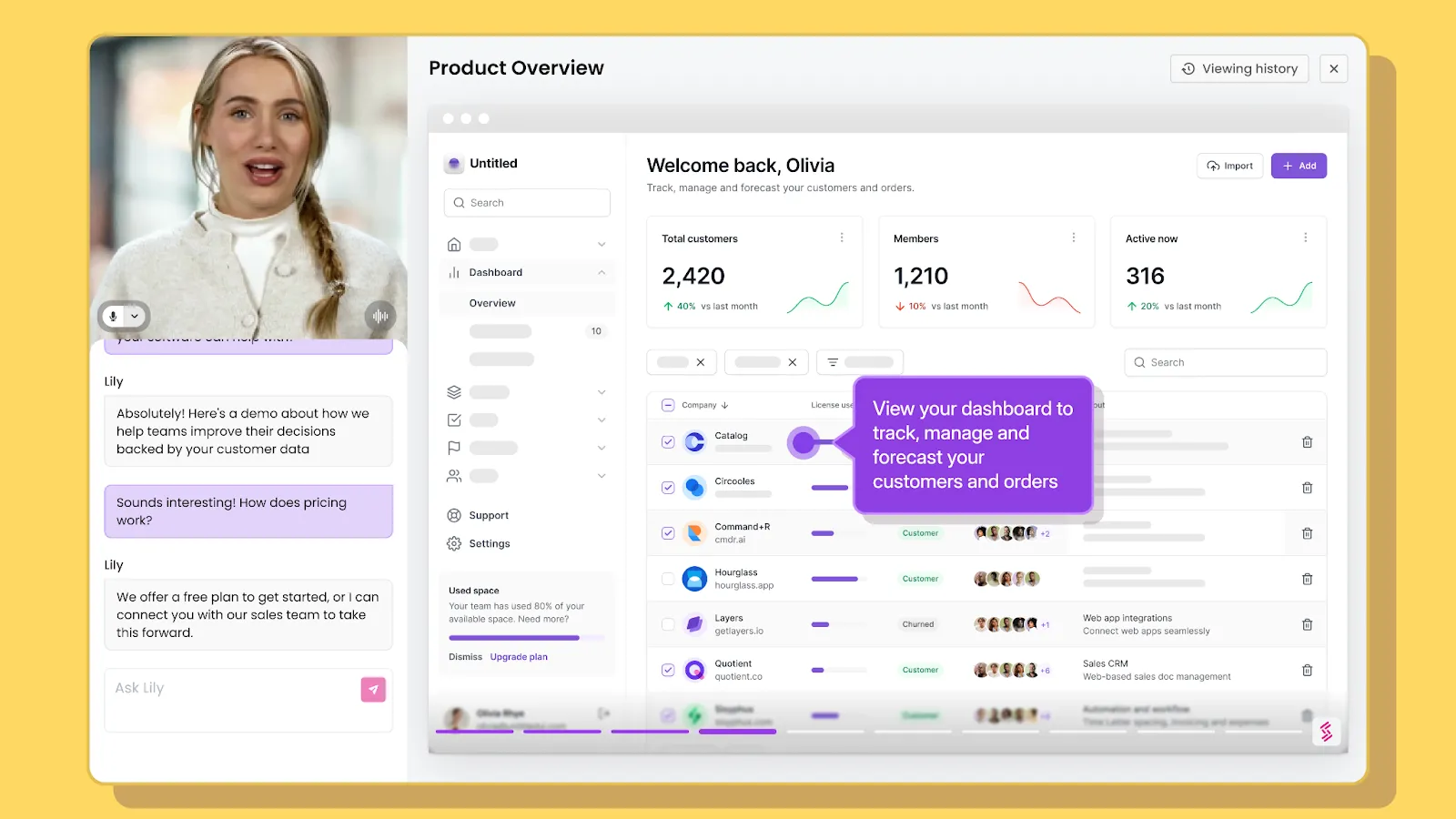







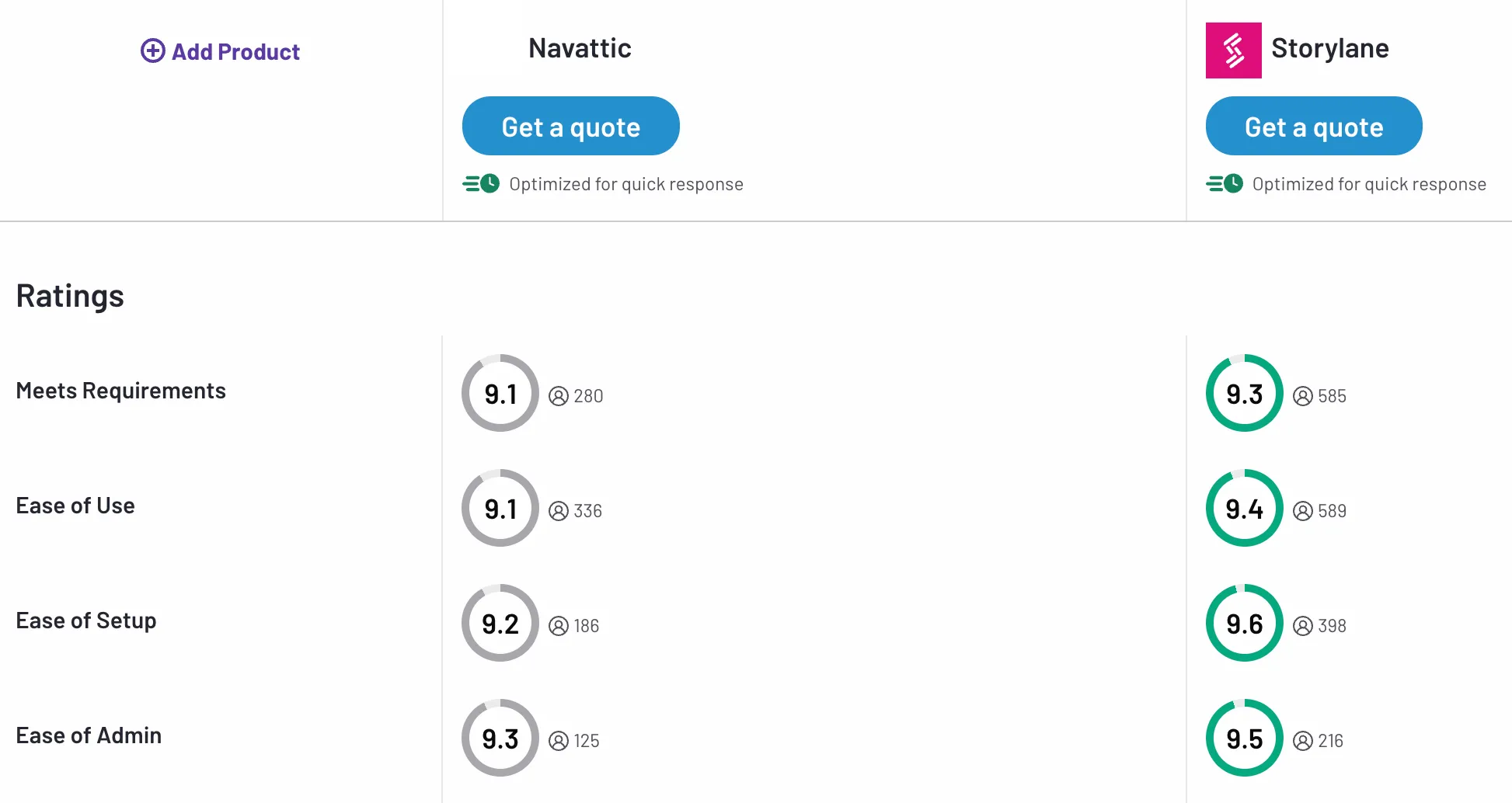

.svg)

.webp)